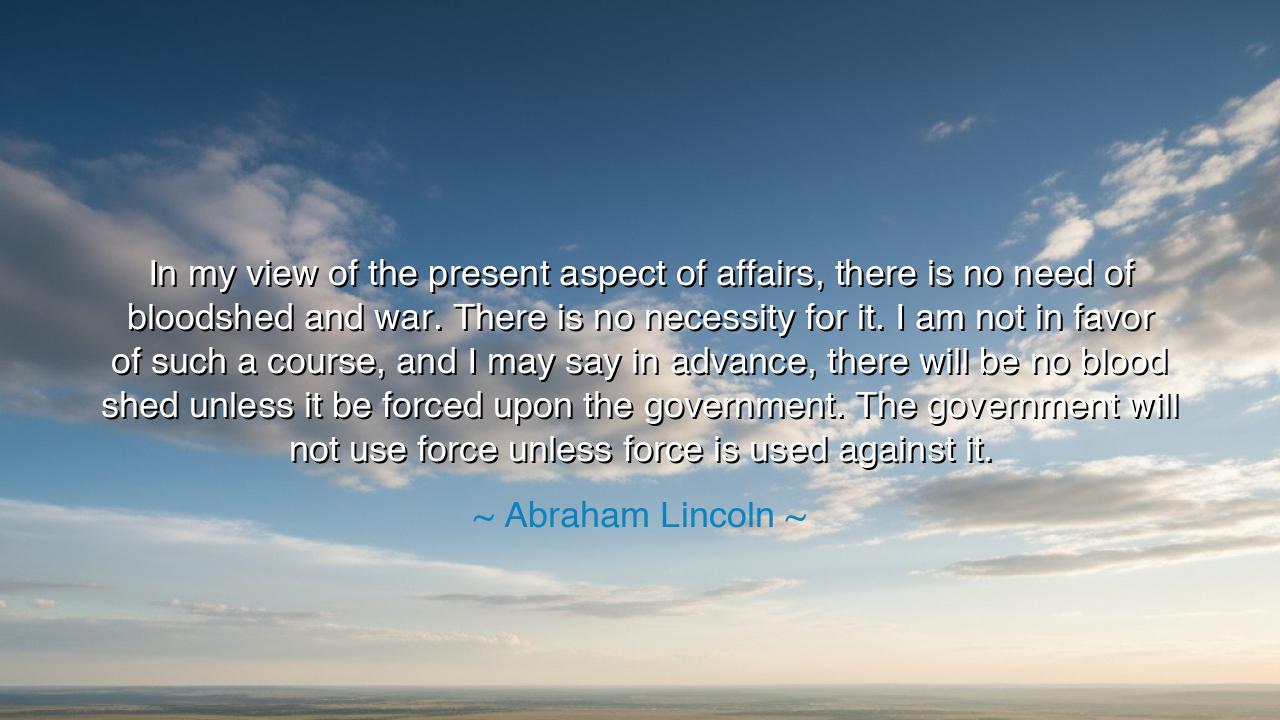
In my view of the present aspect of affairs, there is no need of
In my view of the present aspect of affairs, there is no need of bloodshed and war. There is no necessity for it. I am not in favor of such a course, and I may say in advance, there will be no blood shed unless it be forced upon the government. The government will not use force unless force is used against it.






"In my view of the present aspect of affairs, there is no need of bloodshed and war. There is no necessity for it. I am not in favor of such a course, and I may say in advance, there will be no blood shed unless it be forced upon the government. The government will not use force unless force is used against it." – Abraham Lincoln
In this solemn and measured declaration, Abraham Lincoln spoke not as a conqueror, but as a guardian of peace standing upon the trembling edge of war. These words were uttered in the early days of 1861, before the guns of Fort Sumter thundered and the American Union was torn asunder. Lincoln’s message was a plea born of wisdom and restraint—a warning wrapped in mercy. He sought not the triumph of one side over another, but the preservation of a nation’s soul. His voice carried both strength and sorrow, for he knew that war, once unleashed, devours the hearts of all who wage it.
The origin of this quote lies in the fragile dawn of Lincoln’s presidency, when eleven Southern states had declared their secession from the Union. The air was thick with rage, fear, and defiance. Many demanded that Lincoln strike swiftly, crush rebellion with iron and fire. Yet Lincoln, ever the man of conscience, refused to be ruled by passion. He believed that reason must precede violence, and that the first duty of leadership is not vengeance, but preservation. His words were both a promise and a principle: the government would not shed blood unless blood was demanded of it. It was the language of restraint spoken by one who understood that peace, even fragile peace, is sacred until it is utterly impossible.
In these words, one can hear the echoes of an ancient truth—that violence is the last refuge of failed wisdom. Lincoln’s refusal to strike first was not weakness; it was the strength of a man who understood that power without moral discipline becomes tyranny. He sought to give his enemies every chance to return to reason before the storm of war broke. He wished to preserve the Union not by coercion, but by conscience. Yet when the first shot was fired upon Fort Sumter, Lincoln’s vow was fulfilled: the government would not use force unless force was used against it. Thus began the Civil War—a tragedy not of his choosing, but of his enduring responsibility.
History bears many such examples where leaders sought peace but were met with violence. Consider the story of Mahatma Gandhi, who, centuries later, faced the British Empire with no army but his own conviction. He too believed that force breeds only ruin, and that moral courage surpasses the might of weapons. When others urged him toward insurrection, he replied that freedom won by blood is too easily lost to hatred. In this, he walked a path similar to Lincoln’s—seeking justice through patience, appealing to the conscience of adversaries rather than their fear. Both men understood that the true victory is not the defeat of the enemy, but the preservation of humanity itself.
Lincoln’s quote also reveals the moral architecture of legitimate power. The government, he insisted, would not be the aggressor—it would defend, but not destroy. This principle separates justice from domination, authority from despotism. For government, in Lincoln’s view, exists not to compel obedience through terror, but to uphold the peace in which liberty can live. The state that strikes without provocation betrays its purpose; the leader who wages war for glory has already lost his honor. Lincoln’s restraint thus became a moral compass, guiding not only his nation, but all who would wield power in the shadow of conflict.
There is, too, a deep spiritual wisdom here. Lincoln understood that the call to peace must always precede the call to arms. A just man must exhaust every path of understanding before he allows the sword to fall. For once the sword is drawn, mercy becomes a casualty, and the hearts of men grow numb to reason. This is not only the law of nations—it is the law of the soul. Within each of us, when anger rises and conflict threatens, we too must remember Lincoln’s balance: that force must never lead, only follow necessity.
The lesson, then, is both political and personal. True strength lies in restraint, not in fury; in principle, not in impulse. To act with justice is to strike only when every other door has closed, and to strike not from hatred, but from duty. Peace is not the absence of power—it is the mastery of it. Lincoln’s wisdom calls us to govern our own tempers as he governed his nation: with patience, humility, and an unyielding devotion to what is right.
And so, the practical actions are these: When faced with conflict, first seek to understand, not to conquer. Let no decision be born of rage. Defend truth, but do not delight in struggle. Remember that every sword raised in haste cuts not only the enemy, but one’s own humanity. For as Lincoln proved with his life and legacy, the greatest leaders—and the greatest souls—are those who know that the power to refrain is greater than the power to strike, and that peace, once lost, is the hardest victory of all to win back.






AAdministratorAdministrator
Welcome, honored guests. Please leave a comment, we will respond soon